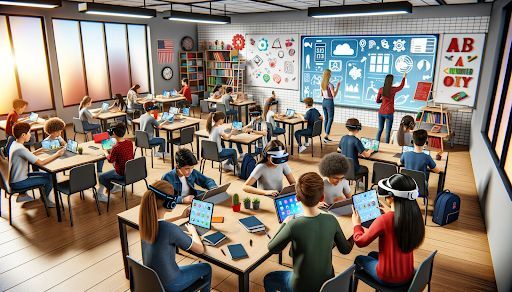In recent years, the fusion of business and technology in the education sector, known as EdTech, has transformed traditional classrooms and learning methodologies. This dynamic industry not only promises enhanced educational experiences but also represents a lucrative opportunity for businesses. Here’s a deep dive into how EdTech is reshaping education, illustrated through statistics, listicles, and case studies.

1. The Growth of EdTech: A Statistical Overview
The EdTech sector has witnessed exponential growth, driven by the increasing demand for digital learning tools and platforms. Here are some compelling statistics that highlight this trend:
- Global Market Value: The global EdTech market is projected to reach $404 billion by 2025, growing at a compound annual growth rate (CAGR) of 16.3% from 2018 to 2025.
- Investment Surge: In 2021, venture capitalists invested over $16.1 billion in EdTech startups, a significant increase from $7 billion in 2019.
- Digital Learning Adoption: As of 2023, over 1.2 billion children in 186 countries are impacted by school closures due to the COVID-19 pandemic, accelerating the adoption of digital learning platforms.
Related Content:
2. Top EdTech Innovations Transforming Education
2.1. Learning Management Systems (LMS)
Learning Management Systems (LMS) like Canvas, Moodle, and Blackboard have revolutionized the way educators deliver and manage courses. They provide a centralized platform for course materials, assignments, and communications, facilitating a more organized and accessible learning environment.
2.2. Gamification
Gamification integrates game elements into educational activities to increase student engagement and motivation. Platforms like Kahoot! and Classcraft use gamified learning to make education more interactive and enjoyable.
2.3. Artificial Intelligence (AI) and Machine Learning
AI and machine learning are being used to personalize learning experiences. Tools like Carnegie Learning and Smart Sparrow adapt to the individual needs of students, providing customized resources and feedback.
2.4. Virtual and Augmented Reality (VR/AR)
VR and AR technologies create immersive learning experiences. Apps like Google Expeditions and Nearpod VR allow students to explore virtual worlds and complex concepts, enhancing their understanding and retention.
2.5. Mobile Learning
Mobile learning platforms like Duolingo and Khan Academy make education accessible anytime, anywhere. These apps offer a flexible approach to learning, accommodating different schedules and learning paces.
3. Case Studies: Success Stories in EdTech
3.1. Khan Academy: Democratizing Education
Founded in 2008, Khan Academy has become a cornerstone in the EdTech industry. By offering free online courses across various subjects, it democratizes access to quality education. The platform uses data analytics to provide personalized learning paths, ensuring that students learn at their own pace.
Impact: With over 70 million registered users worldwide, Khan Academy has significantly reduced educational inequalities, particularly in underprivileged regions.
3.2. Coursera: Bridging the Skill Gap
Coursera partners with top universities and companies to offer online courses, certificates, and degrees. Its business model caters to both individual learners and enterprises, addressing the skill gap in the workforce.
Impact: With more than 77 million learners and partnerships with over 200 universities, Coursera has transformed professional development and higher education.
3.3. BYJU’S: Leading EdTech in Emerging Markets
India-based BYJU’S has leveraged technology to create engaging and interactive learning experiences. Its app offers comprehensive learning programs for students from grades 1-12, integrating video lessons and interactive quizzes.
Impact: BYJU’S has over 100 million registered students and 6.5 million annual paid subscriptions, making it one of the world’s largest EdTech companies.
3.4. AltSchool: Personalized Learning in Action
AltSchool, founded by former Google executive Max Ventilla, aims to provide personalized education through micro-schools and innovative software. The platform allows teachers to customize curriculum and assessments to meet individual student needs.
Impact: Although it transitioned from running its own schools to providing educational software, AltSchool’s approach has influenced many schools to adopt personalized learning models.
4. Challenges and Future of EdTech
Despite its growth, the EdTech industry faces several challenges:
- Digital Divide: Access to technology and the internet remains unequal, especially in rural and low-income areas.
- Privacy Concerns: The increased use of digital platforms raises concerns about student data privacy and security.
- Teacher Training: Effective integration of EdTech requires substantial teacher training and support.
Future Outlook: The future of EdTech looks promising, with advancements in AI, data analytics, and immersive technologies poised to create even more personalized and effective learning experiences. Governments and private sectors must collaborate to address the digital divide and ensure equitable access to technology.
Conclusion
The intersection of business and technology in education is creating unprecedented opportunities for both learners and entrepreneurs. As EdTech continues to evolve, it promises to make education more accessible, engaging, and effective. By staying informed about the latest trends and innovations, business enthusiasts can leverage this growing sector to make a significant impact.

Founder Dinis Guarda
IntelligentHQ Your New Business Network.
IntelligentHQ is a Business network and an expert source for finance, capital markets and intelligence for thousands of global business professionals, startups, and companies.
We exist at the point of intersection between technology, social media, finance and innovation.
IntelligentHQ leverages innovation and scale of social digital technology, analytics, news, and distribution to create an unparalleled, full digital medium and social business networks spectrum.
IntelligentHQ is working hard, to become a trusted, and indispensable source of business news and analytics, within financial services and its associated supply chains and ecosystems










